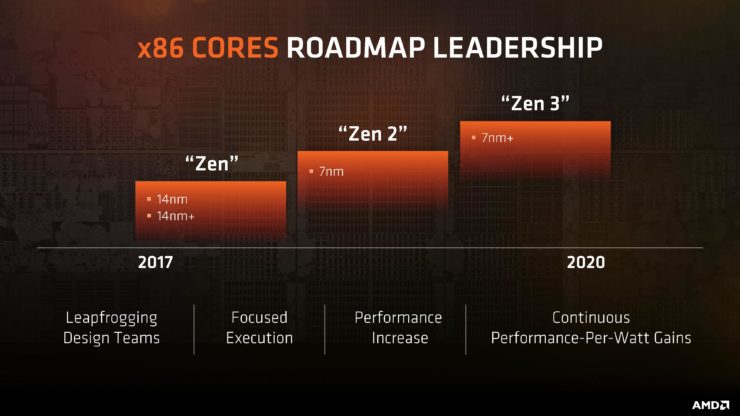TSMCs 5nm+ is divided between Apple and Qualcomm for this year with some uncertainty over the Hisilicon 5nm Kirin chip. Mobile gets the latest node as mobile-intent SoCs benefit greatly from the smaller geometry, lower power, and higher performance per square millimeter.
AMD has been toying with 7nm on both CPU and GPU and will get to 5nm very soon, but not with Zen 3 in server or desktop variant and not this year.
Zen 3 has been cooked for a while, it was supposed to launch/get announced in late May in Computex 2020, and now it is obviously poised for later. AMD calls 7nm process from TSMC that is planned for Zen 3 processors 7nm+. The Zen 3 desktop part is codenamed Vermeer, and the server Zen 3 is codenamed Milan.
Zen 4 is the next in line, and this one will end up with a smaller node or 5nm. It is unlikely we will see 5nm AMD products as soon as next year, but we don't know more than that.
What happens after Zen 4 is what piques our interest as the Zen generation was designed initially by Jim Keller and executed by Mike Clark after Keller left.
AMD already had delays in its original roadmap announcing Zen + before Zen 2. According to people close to the matter, this was not planned initially, but Zen 2 delays had to make AMD improvise with the slightly improved Zen+ as the successor to Zen. The old 2017 official roadmap above reminds us that Zen+ was initially never meant to be and that Zen 3 was always aimed for 2020 and 7nm+.
Back at the AMD Financial Analyst Day 2020 in March, AMD updated both its CPU and GPU roadmaps, already confirming that Zen 3 is based on a 7nm manufacturing process and that Zen 4 will switch to 5nm. Interestingly, AMD called the new process 7nm+ but the latest roadmap just uses 7nm.

The ability to add more cores than Intel helps in heavy multi-tasking workloads, especially rendering. However, AMD still severely lags over Intel Skylake based Coffee Lake S 10th generation in gaming and single-threaded workloads.
Late 2020 and 2021 and the introduction of Intel's new non-Skylake based cores will likely shift the benefits into the blue giant's favor, but this remains to be seen. AMD has had a good run with Zen, but it looks like it takes a different core, redesigned to challenge Intel in single task workloads.




